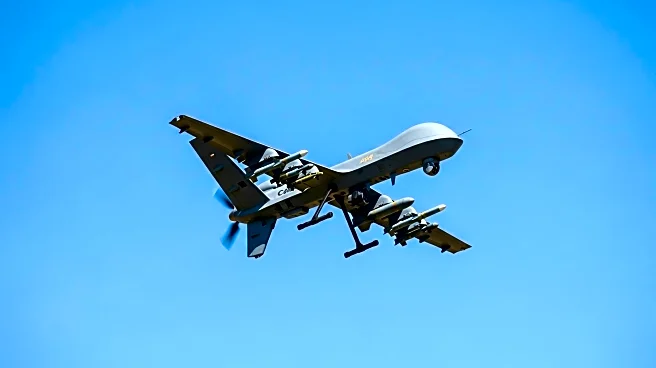What is the story about?
What's Happening?
Mali's military has launched airstrikes in the Kayes region after militants linked to al-Qaida announced a blockade of fuel imports to Bamako, the capital. The blockade, declared by Jama'at Nusrat al-Islam wal-Muslimin (JNIM), aims to restrict movement in western towns near the Senegal and Mauritania borders. Residents reported that militants have been stopping and emptying fuel trucks since the announcement. The military, which came to power through coups in 2020 and 2021, is attempting to counteract the pressure from militant groups encircling towns in the Sahel. The army confirmed operations in Diema and Nioro, freeing hostages taken by militants. The blockade has led to transport companies suspending operations between Bamako and Dakar, and blocking roads to Segou.
Why It's Important?
The blockade and subsequent military response highlight the ongoing instability in Mali and the broader Sahel region. The actions of JNIM are aimed at weakening the transitional government in Bamako, potentially leading to increased civilian unrest. This situation poses significant risks to regional security and economic activities, particularly affecting multinational mining operations in Kayes. The ability of jihadist groups to enforce such blockades demonstrates their growing influence and capacity to disrupt essential services, which could further destabilize the region and impact international investments.
What's Next?
The military's response may lead to further confrontations with militant groups, potentially escalating violence in the region. The transitional government may face increased pressure to stabilize the situation and ensure the safety of transport routes and economic activities. International stakeholders, including mining companies, may need to reassess their operations and security measures in Mali. The situation could also prompt regional and international diplomatic efforts to address the security challenges in the Sahel.
Beyond the Headlines
The blockade and military response underscore the complex dynamics in the Sahel, where militant groups exploit political instability to gain influence. The situation raises ethical questions about the impact on civilian populations and the role of international actors in supporting regional stability. Long-term solutions may require addressing underlying socio-economic issues and strengthening governance structures to prevent further militant encroachment.















